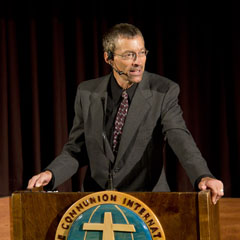This briefing from the Legal Department concerns how the denomination or local churches may or may not legally become involved in political or election activities.
Although the 2012 presidential elections are more than a year away, the media is currently abuzz with talk about the various potential candidates and the primaries for the major parties, which are only a few months from starting. In every election season, this one included, the IRS issues guidelines and cautions for churches about what is permissible and impermissible in regard to political involvement (mostly impermissible!). Often, other groups, including in previous years the National Association of Evangelicals, issue long, detailed reports explaining where the legal “line” is separating the permissible from the impermissible. It is important for churches to avoid any impermissible political involvement, since violating the law in this area can bring serious penalties upon a church, including the complete loss of its tax-exempt status.
Although the law regarding involvement of churches in political matters forbids most such activities, some very few political expressions or actions are allowed, under narrow circumstances. However, notwithstanding any narrow or slight activities that might be allowed under the law, it is the policy of the denomination that its local churches are not to engage in any political activities or statements whatsoever. This policy is based on two over arching principles:
1) The law is complicated and even lawyers can and do argue about how it might apply in any given case, which means staying completely out of the political field is the only safe course.
2) The Denomination simply does not believe that local pastors or church leaders should be trying to influence local members or the community at large about whom they should support or what political view or position they should take.
In light of this strict “nonpolitical activity” policy, pastors and church leaders should refrain from all such activities, including refraining from statements in sermons suggesting one political party is better, more Christian, more in line with the Bible, etc. than the other. Neither should any leader praise or condemn either party, any candidate, or any current office holder, including the current president, for things done, said, or not done or unsaid. While it is plain that some issues that face our society are issues about which Christians care, no one in the congregation should feel that he or she is being pushed or pulled by the Church or its leaders to support or vote for or against any party or candidate. Indeed, the congregation should not really be able to discern the pastor or other church leader’s political positions from their public statements. Their public statements should not include political content at all.
In short, our sermons, teachings and community involvement projects should be strictly about the gospel and not about politics. To be clear, our policy is not to be “politically neutral.” Our policy is, instead, to be “apolitical,” meaning “without politics” at all. It can be helpful for our pastors and leaders to state this policy of being “without politics” and “without political content” to the congregation from time to time so that our members understand our policy. If members wish to be politically active in some way, they are of course free to pursue such activities on their own or through affiliations with political groups, but not through the denomination or its local churches. We do not forbid political activism, per se. We only forbid political activism sponsored and endorsed by the church.
It is not always easy for a pastor to clearly separate his “personal” life from his “professional” life. The two are almost inextricably intertwined in a listener’s mind. For this reason, even in a situation where views about a political candidate or position might accidentally or inadvertently come up, church leaders should make it absolutely clear that their political thoughts are personal to them and are not in any way an official representation of the denomination. It should be understood that it would be a violation of the church leader’s responsibilities to the congregation and the denomination, not to mention a violation of the laws protecting churches from the government and protecting the government from churches to deliberately endorse or promote a particular candidate or issue from the pulpit or in any other way in their official capacity as a representative of the church.






